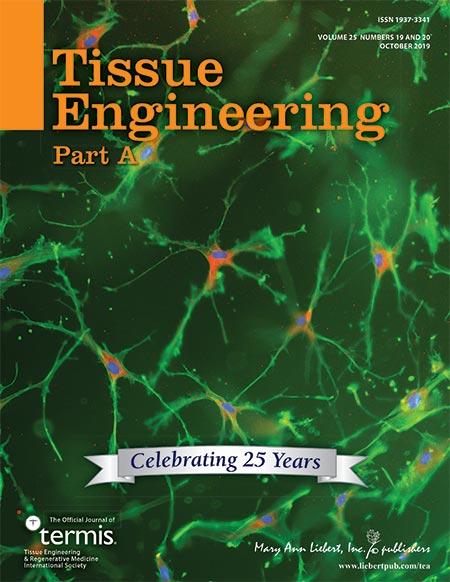
Credit: Mary Ann Liebert, Inc., publishers
New Rochelle, NY, October 16, 2019-Synthetic bone substitutes are promising materials for bone defect repair, but their efficacy can be substantially improved by bioactive agents such as growth factors. In a new study, researchers have modified beta-tricalcium phosphate (β-TCP) with increasing quantities of bone morphogenetic protein 2 (BMP-2) derived from E. coli and shown improved bone healing. The study is published in Tissue Engineering, a peer-reviewed journal from Mary Ann Liebert, Inc., publishers. Click here to read the article free on the Tissue Engineering website through November 16, 2019.
Yuelian Liu, PhD, Academic Center for Dentistry Amsterdam, Amsterdam, Netherlands, and colleagues present their work in an article titled “Dose Effects of Slow-Released Bone Morphogenetic Protein-2 Functionalized β-Tricalcium Phosphate in Repairing Critical-Sized Bone Defects”.
The authors created bone defects in a rat calvarial model and then attempted repair using β-TCP granules coated with a biomimetic calcium phosphate preparation that allows slow release of BMP-2. Bone growth and maturation were studied in comparison with autologous bone grafts using micro-CT scans, histology, and histomorphometry, and toxicity was assessed with blood tests. The E. coli-derived BMP-2 successfully improved bone formation with efficacy comparable to autologous grafts, and higher BMP-2 concentration promoted bone maturation.
“The dosage effect of E. coli-derived BMP-2 on bone formation provides valuable information for researchers and commercial stakeholders interested in a more cost-effective BMP-2 source compared to traditional mammalian cell production,” says Tissue Engineering Co-Editor-in-Chief Antonios G. Mikos, PhD, Louis Calder Professor at Rice University, Houston, TX. “In addition, the application of a biomimetic coating system presented by the authors is crucial for translating these findings into transformative clinical bone regeneration strategies.”
###
About the Journal
Tissue Engineering is an authoritative peer-reviewed journal published monthly online and in print in three parts: Part A, the flagship journal published 24 times per year; Part B: Reviews, published bimonthly, and Part C: Methods, published 12 times per year. Led by Co-Editors-in-Chief Antonios G. Mikos, PhD, Louis Calder Professor at Rice University, Houston, TX, and John P. Fisher, PhD, Fischell Family Distinguished Professor & Department Chair, and Director of the NIH Center for Engineering Complex Tissues at the University of Maryland, the Journal brings together scientific and medical experts in the fields of biomedical engineering, material science, molecular and cellular biology, and genetic engineering. Leadership of Tissue Engineering Parts B (Reviews) and Part C (Methods) is provided by Katja Schenke-Layland, PhD, Eberhard Karls University, Tübingen, Heungsoo Shin, PhD, Hanyang University; and John A. Jansen, DDS, PhD, Radboud University, and Xiumei Wang, PhD, Tsinghua University respectively. Tissue Engineering is the official journal of the Tissue Engineering & Regenerative Medicine International Society (TERMIS). Complete tables of content and a sample issue may be viewed on the Tissue Engineering website.
About the Publisher
Mary Ann Liebert, Inc., publishers is a privately held, fully integrated media company known for establishing authoritative peer-reviewed journals in many promising areas of science and biomedical research, including Stem Cells and Development, Human Gene Therapy, and Advances in Wound Care. Its biotechnology trade magazine, GEN (Genetic Engineering & Biotechnology News), was the first in its field and is today the industry’s most widely read publication worldwide. A complete list of the firm’s 80 journals, books, and newsmagazines is available on the Mary Ann Liebert, Inc., publishers website.
Media Contact
Kathryn Ryan
[email protected]
914-740-2250
Original Source
https:/
Related Journal Article
http://dx.




